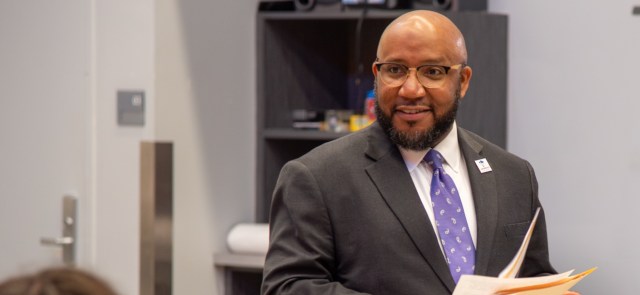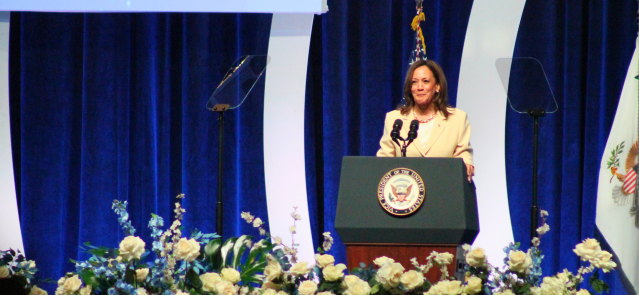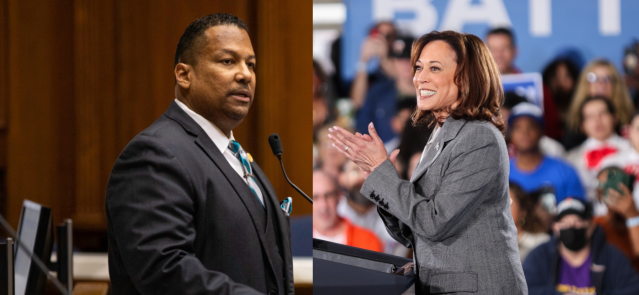Stay ahead of the curve as a political insider with deep policy analysis, daily briefings and policy-shaping tools.
Request a DemoCiscomani Continues Effort to Ratify Northeastern Arizona Indian Water Rights Settlement Agreement
Ciscomani Continues Effort to Ratify Northeastern Arizona Indian Water Rights Settlement Agreement
Gallego Statement on Phoenix VA OIG Report
Gallego Statement on Phoenix VA OIG Report
Kelly, Tillis Introduce Bipartisan Legislation to Increase Access to Plasma-Based Medicines
Kelly, Tillis Introduce Bipartisan Legislation to Increase Access to Plasma-Based Medicines
Incoming Durham superintendent familiar with state’s political makeup
Incoming Durham Public Schools Superintendent Anthony Lewis will begin his new role next month, bringing with him 22 years of education experience.
He’s leaving Kansas, where he served as superintendent of Lawrence Public Schools for the past six years. Lewis sees many political parallels as he prepares for his new post.
Similar to Durham, Lawrence was a “blue dot in a red state,” Lewis said. Kansas has conservative supermajorities in its House and Senate, along with a Democratic governor, mirroring North Carolina.
Lewis said he has seen the positive strides put forward by diversity, equity and inclusion offices, especially in the aftermath of the murder of George Floyd, that are now being dismantled in Kansas. He is aware of the recent UNC System decision to eliminate positions related to diversity, equity and inclusion efforts.
Lewis has been praised for his work within the Kansas African American Affairs Commission and the Commission on Racial Equity and Justice, but he acknowledged the progress from those efforts was “minimal.”
“It’s unfortunate that some of the work that we know needs to be done is so politicized,” Lewis said, crediting the efforts of Gov. Laura Kelly in Kansas but citing the reluctance of conservative supermajorities in the Legislature to act on issues important to the African American community.
Lewis said he looks forward to building relationships with North Carolina legislators and inviting them to visit Durham schools to get a firsthand look at policies impacting the education system, both positive and negative.
“Schools can’t do this work alone,” Lewis said, adding he wants to educate others while recognizing that he will need some education as well.
“We never want any student in their classroom to feel less than or that they caused harm,” he said. “It’s important for us to really understand, teach accurate history, so that we won’t repeat it.”
Lewis, who looks forward to being much closer to his family in Alabama, will begin his position as Durham superintendent Aug. 12.
“That’s the work I’ve been doing pretty much my entire educational career and that’s why I do believe Durham Public Schools is a great fit for my experiences,” Lewis said, adding that questions regarding racial equity were at “every step” of his hiring process. “I just want to come in and continue and even excel at some of the work that is already taking place there.”
For questions or comments, or to pass along story ideas, please write to Matthew Sasser at [email protected] or contact the NC Insider at [email protected] or @StateAffairsNC
In Indianapolis, Harris says she’s fighting for America’s future
Vice President Kamala Harris, the presumptive Democratic presidential nominee, told a gathering of women of color in Indianapolis on Wednesday that she is fighting for America’s future.
She contrasted her vision with another — one she said is “focused on the past.”
“Across our nation, we are witnessing a full-on assault on hard-fought, hard-won freedoms and rights — the freedom to vote, the freedom to be safe from gun violence, the freedom to live without fear of bigotry and hate, the freedom to love who you love openly and with pride, the freedom to learn and acknowledge our true and full history and the freedom of a woman to make decisions about her own body,” she said.
Harris delivered her Wednesday remarks during Zeta Phi Beta Sorority’s 2024 Grand Boulé, a six-day conference held at the Indianapolis Convention Center. The event was closed to the public.
Her approximately 15-minute speech received a standing ovation from thousands of women of color. Founded in 1920 on Howard University’s campus, the sorority is one of nine historically Black Greek-letter organizations that make up the National Pan-Hellenic Council, colloquially known as the Divine Nine.
During her speech, Harris touted familiar policy talking points, highlighting the Biden administration’s forgiveness of student debt, cap on insulin prices for seniors and expansion of the child tax credit. She also thanked President Joe Biden for his service to the country.
Harris received Biden’s endorsement after he announced Sunday his decision to exit the race. By Monday, Harris had reportedly earned the support of enough delegates to secure her party’s nomination.
Other prominent Democrats have endorsed Harris in recent days, including U.S. Secretary of Transportation Pete Buttigieg, Michigan Gov. Gretchen Whitmer and California Gov. Gavin Newsom. Senate Majority Leader Chuck Schumer and House Minority Leader Hakeem Jeffries endorsed Harris during a Tuesday news conference.
A funding windfall has accompanied Harris’ momentum. Her presidential campaign announced it had raised $81 million within 24 hours of Biden’s decision to exit the race.
Harris held her first rally Tuesday in Wisconsin, a battleground state. There, she said she aimed to unite her party, which for weeks had encouraged Biden to drop out of the race. A former prosecutor in California, she also quipped she knows former President Donald Trump’s “type.”
On Wednesday, Harris attacked the Heritage Foundation’s Project 2025, a proposed transition plan for if Trump wins the presidential election. Trump said in a social media post earlier this month that he knows nothing about Project 2025.
“Can you believe they put that in writing?” Harris asked the crowd.
She claimed Project 2025 was “a plan to return America to a dark past.” She called the crafters of the plan “extremists” and said, “We are not going back.”
If Harris wins her party’s nomination next month, she will take on Trump in the November presidential election.
According to the Indiana Democratic Party, Wednesday marked Harris’ third stop in Indianapolis since 2019. And though her speech excited the Zeta Phi Beta crowd, Harris faces a difficult path to winning the solidly red Hoosier state, where a Democrat hasn’t won a statewide election since 2012.
The Indiana GOP criticized Harris in a Wednesday news release, saying the next four years would be “more radical” than the last if she were elected president.
“Joe Biden tasked Kamala Harris to be our border czar, and it’s been an unmitigated disaster, as every day thousands of illegal immigrants are following through our southern border with an end goal of either taking Hoosier jobs or bringing drugs to our state, and it needs to stop,” U.S. Sen. Mike Braun, the Republican nominee for governor, said in the release.
Contact Jarred Meeks on X @jarredsmeeks or email him at [email protected].
Indiana Black Legislative Caucus endorses Harris, pledges future support
The Indiana Black Legislative Caucus unanimously voted Wednesday to endorse Vice President Kamala Harris’ presidential run and will look at ways to assist her candidacy, the caucus chair, state Rep. Earl Harris Jr., D-East Chicago, told State Affairs.
The caucus is made up of 14 members of the Indiana General Assembly, all of whom are Democrats.
The vote came as Vice President Harris was speaking to members of the historically Black Zeta Phi Beta sorority at the Indiana Convention Center on Wednesday. The stop was one of her first since she entered the race following President Joe Biden’s decision to end his reelection bid on Sunday.
Continue reading “Indiana Black Legislative Caucus endorses Harris, pledges future support”


